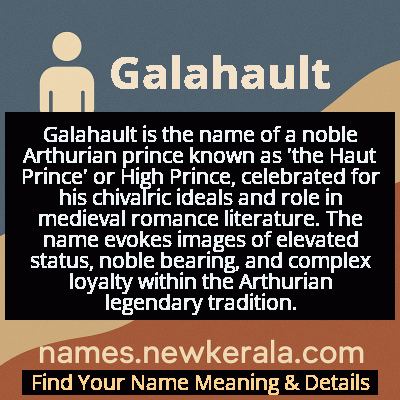Galahault Name Meaning & Details
Origin, Popularity, Numerology Analysis & Name Meaning of Galahault
Discover the origin, meaning, and cultural significance of the name GALAHAULT. Delve into its historical roots and explore the lasting impact it has had on communities and traditions.
Name
Galahault
Gender
Male
Origin
Arthurian
Lucky Number
2
Meaning of the Name - Galahault
Galahault is the name of a noble Arthurian prince known as 'the Haut Prince' or High Prince, celebrated for his chivalric ideals and role in medieval romance literature. The name evokes images of elevated status, noble bearing, and complex loyalty within the Arthurian legendary tradition.
Galahault - Complete Numerology Analysis
Your Numerology Number
Based on Pythagorean Numerology System
Ruling Planet
Moon
Positive Nature
Diplomatic, friendly, artistic, empathetic.
Negative Traits
Over-sensitive, moody, indecisive, prone to self-pity.
Lucky Colours
Green, cream, white.
Lucky Days
Monday.
Lucky Stones
Pearl, moonstone.
Harmony Numbers
1, 3, 4.
Best Suited Professions
Diplomats, mediators, caregivers, artists.
What People Like About You
Cooperative spirit, friendliness, artistic talent.
Famous People Named Galahault
Galahaut the Haut Prince
Arthurian Prince
Key figure in the Lancelot-Guenevere romance who facilitated their relationship
Galahaut of Surluse
Arthurian Knight
Ruler of the Distant Isles who became one of Arthur's allies
Galahaut the Proud
Literary Character
Central figure in the Prose Lancelot known for his pride and eventual humility
Name Variations & International Equivalents
Click on blue names to explore their detailed meanings. Gray names with will be available soon.
Cultural & Historical Significance
This makes him a crucial figure in exploring themes of courtly love, loyalty, and the tensions between personal desire and feudal obligation that characterize much Arthurian romance. Galahault's eventual tragic end, dying of grief when he believes Lancelot has been killed, transforms him into a symbol of profound friendship and the destructive power of deep emotional bonds in medieval chivalric culture. His character represents the noble outsider who becomes more devoted to Arthurian ideals than many native knights, illustrating the transformative power of Camelot's vision.
Extended Personality Analysis
Galahault is characterized by a complex blend of pride and humility, ambition and loyalty. As 'the Haut Prince,' he initially displays immense pride in his military prowess and territorial ambitions, challenging Arthur's supremacy with confidence in his own strength. However, his encounter with Lancelot reveals a capacity for deep emotional connection and self-sacrifice that becomes the defining feature of his character. He demonstrates extraordinary loyalty once he gives his allegiance, particularly to Lancelot, whom he serves with almost devotional fervor.
This combination of warrior pride and emotional vulnerability makes him one of the most psychologically nuanced figures in Arthurian literature. His personality evolves from ambitious conqueror to selfless friend, showing remarkable emotional intelligence in his understanding of romantic relationships and his willingness to facilitate the love between Lancelot and Guinevere despite the personal cost to his own standing and ambitions. His ultimate death from grief demonstrates the depth of his emotional capacity and the medieval belief in the physical effects of profound sorrow.
Modern Usage & Popularity
In contemporary times, Galahault remains primarily a literary and historical name rather than a common given name. Its usage is almost exclusively confined to Arthurian enthusiasts, historical reenactors, and parents seeking unique names with medieval romance connections. The name appears occasionally in fantasy literature and gaming communities where Arthurian themes are popular, though it hasn't entered mainstream naming trends. The name's complexity and distinctive sound, combined with its tragic romantic associations, make it more likely to be used as a middle name or character name rather than a first name in modern contexts, maintaining a niche appeal among those appreciating its noble connotations.
Symbolic & Spiritual Meanings
Galahault symbolizes the tension between ambition and loyalty, pride and humility that defines the Arthurian ideal of chivalry. As 'the Haut Prince,' he represents elevated status and noble bearing, yet his story demonstrates how even the highest nobility must bow to emotional truths and personal connections. His role as the facilitator of Lancelot and Guinevere's romance makes him a symbol of intermediary love—the friend who enables passion while remaining somewhat outside it, representing the complex dynamics of courtly love relationships. His tragic death from grief symbolizes the medieval concept of 'love-sickness' and the idea that profound emotional bonds can be literally fatal, embodying the paradox of the noble outsider who becomes more devoted to Arthurian ideals than many native knights.

